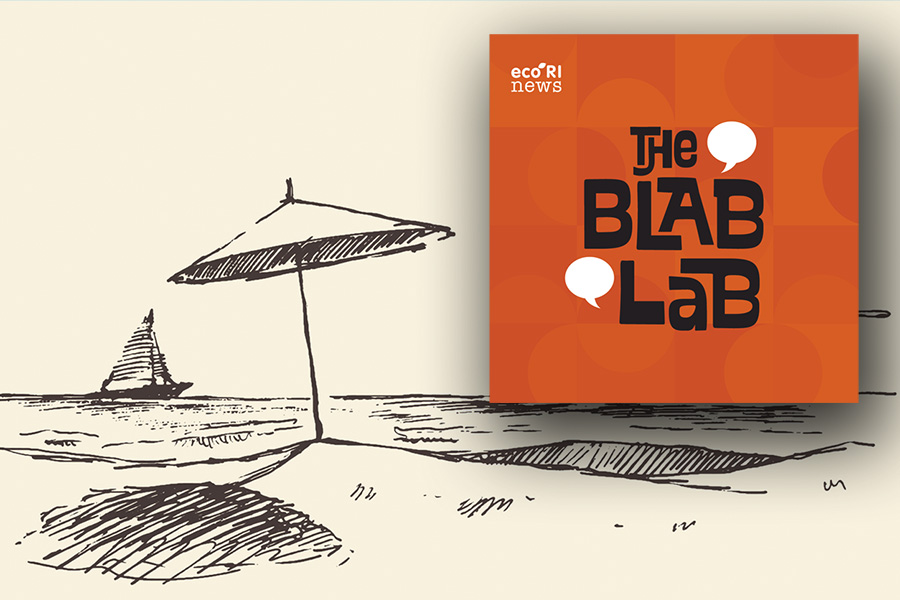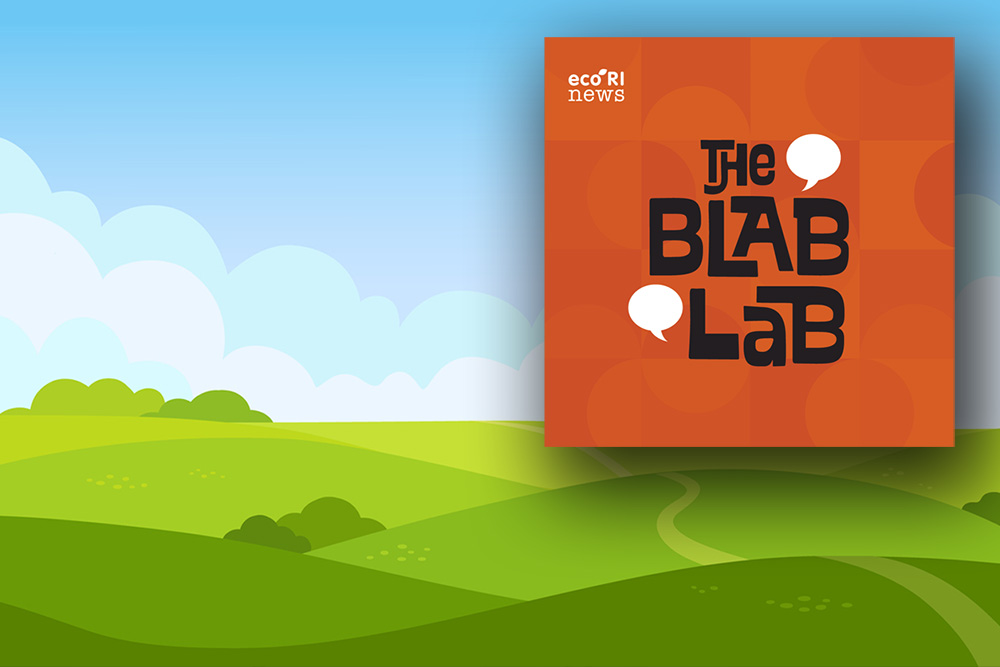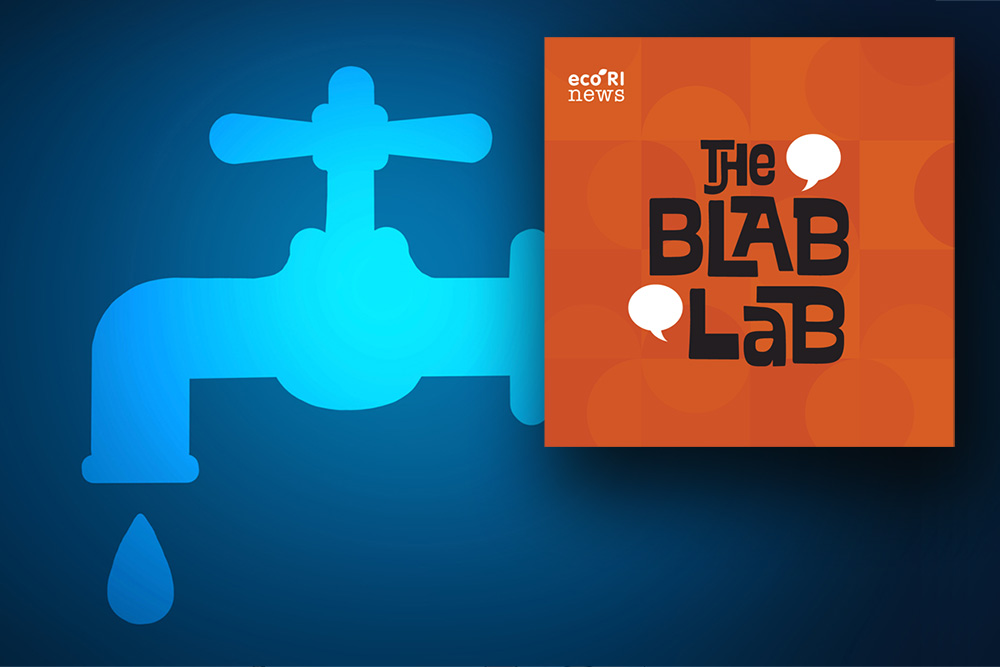Shining a Light on Dark Money
June 1, 2023
ecoRI News reporters Colleen Cronin and Frank Carini discuss the impacts of dark money on the local spread of climate misinformation. Does the disclosure of this dark money even matter to a society bitterly divided and flooded with disinformation?
Subscribe and listen on iTunes, Spotify, Stitcher, or wherever you get your podcast.
This transcript was edited for clarity and length.
Colleen Cronin
Welcome to The Blab Lab, a twice monthly podcast from ecoRI News, where we unpack the critical environmental issues facing the southern New England. Today I’m here with senior reporter and columnist Frank Carini to discuss the impact of dark money in Rhode Island.
Before we get started, I’m wondering if you can just talk about what dark money is.
Frank Carini
It’s just where money’s coming from. We’ll talk about it in terms of the fossil-fuel dark money, but it’s who’s funding organizations such as the Heartland Institute or the Heritage Foundation to spew their lies and discredit science. These organizations are propped up by money from fossil fuel companies, or from Koch brothers and Koch Industries that made all their money in extracting fossil fuels. So, it’s basically hiding … the money is there … we just don’t know where it’s coming from. Citizens United was a big part of it. You don’t have to let people know who’s funding you to spew garbage.
Colleen Cronin
Can you talk a little bit about Citizens United and what it did, and when it happened.
Frank Carini
There was a Supreme Court case that equated money with free speech, and it allowed this dark money to take over campaigns — and it’s protected. Before that, [the money] had to be disclosed. You had to know who’s funding this politician’s campaign, so you get an idea of where they’re coming from. And now it’s all hidden. These organizations get propped up by this dark money, hidden money, secret money, and then they go and attack whatever they want to bring down.
Colleen Cronin
And they don’t necessarily then have to be associated with it, especially if it’s something that maybe goes against other missions that they have or would hurt them to disclose.
Frank Carini
Yeah, and I don’t even know if it would hurt anymore, the way that things have changed. So, say we’re talking about fossil fuels. Say we know the Heartland Institute … say we didn’t know who was funding them; they’re really pro-fossil fuel; but it takes work to find out who’s paying them. The Guardian has done great work uncovering this, but even if it was out in the open would it matter? I mean, The Guardian’s made it known, ProPublica’s made it known, other newspapers have made it known. So, it’s kind of known anyway. Do people care? It doesn’t seem like they do. Would they be pushing for renewable energy if they knew that, you know, ExxonMobil was funding the Rhode Island Center for Freedom & Prosperity that basically is a part of the cabal of locally spreading climate misinformation and fossil fuel propaganda?
Colleen Cronin
In this column you recently wrote, you focus on Mike Stenhouse and Rhode Island Center for Freedom & Prosperity, which is based in Cranston. Who is Stenhouse, and what does the center have to do with dark money?
Frank Carini
When it comes to fossil fuels? It’s a think tank, a right-leaning think tank, that, at least when it comes to fossil fuels, just spreads misinformation. It’s a nonprofit, a 501(c)(3). They don’t list any of their donors, because — his reason for it … they’ll be attacked by the, you know, Antifa, I guess, or Black Lives Matter, or, you know, treehuggers? I don’t know. So that’s why he hides his donations. In the last 990 I could find, they list $370,000 in contributions, all of it was from donors, but we don’t know where that came from. You have to connect the dots.
And it takes a lot of research and sniffing around to see if the fossil fuel companies fund them … Stenhouse’s organization is in that mix of climate denialism …
Colleen Cronin
So, is that illegal to not disclose?
Frank Carini
It’s not illegal. But he has another web page talking about how important transparency is, yet his organization doesn’t practice it.
Colleen Cronin
Stenhouse and the Rhode Island Center for Freedom & Prosperity … what are they advocating? They’re specifically advocating against some of these climate change policies?
Frank Carini
Anytime something comes up in Rhode Island against fossil-fuel pollution or the burning of carbon, they make it sound like families are going to crumble, the world’s going to end, the jobs will be lost. It’s just a bunch of misinformation or twisting of facts to protect the status quo and protect the fossil fuel industry.
Colleen Cronin
Just to play devil’s advocate … For anyone who listens to those arguments the center is making, or the wider national anti-climate change movement is making, about worrying about jobs, or worrying about some of these things. What would you say against that? Because I think what is sometimes very smart about these arguments is they do hit at people’s big fears. And sometimes I think things can get twisted, or facts can get twisted.
Frank Carini
Look at Rhode Island, we don’t have drilling for natural gas or oil here. So, there’s no such thing as those jobs. There’s delivery of oil, but if we stopped doing the delivery of oil, there would still be jobs — of building wind turbines, building solar-energy panels.
I would argue there’d be more jobs. There wouldn’t be a loss of jobs. It’d mean training for different jobs. Like I said, there aren’t fossil fuel jobs here. We’re not mining for coal, or setting wells, or fracking here, or anything like that. So, there’d be plenty of jobs — to redo the regional power grid, to update it for renewable energy, building charging stations for buses and cars. There’d be plenty of work to do. So, there’ll be plenty of jobs. It’s just fearmongering. And like I said, their strategy is brilliant. I’m talking about the overall strategy of the fossil fuel front groups; they do a very good job at it. They do a brilliant job at it. But I don’t know how they sleep at night.
Colleen Cronin
I’m wondering if you think that it is moving the needle, this dark money?
Frank Carini
It’s working brilliantly to preserve the status quo. Last year, worldwide, the fossil fuel industry made a profit of $4 trillion. And several years before that, they are averaging about $1.5 trillion in profits. So, it’s working beautifully. And it’s working so well it’s going to put future generations in jeopardy, or certainly make their lives miserable, harder.
Colleen Cronin
So, it’s the information itself that’s getting out there that you think is harmful and is dissuading people from combating climate change … Why do you think it’s important to draw attention to dark money? And why do you think it’s important maybe to push legislation or a solution that could make that funding more visible … If you can connect where groups are getting their money from these sources that say that climate change isn’t happening … because it doesn’t benefit them financially to admit that climate change is happening. That could be a step in the direction toward, you know, disproving them?
Frank Carini
Yeah, we’ll go with the Rhode Island Center for Freedom & Prosperity. If we knew that they got 80% of their money from Shell, you would think that that would have an impact. But I don’t know if it would, because people would still buy their massive pickups. And again, I’m not trying to point at those people like they’re bad people, I’m just saying that people are going to still want their big pickups; they don’t want to make change. We collectively don’t want to make change. It’s too hard. We like our leaf blowers and all this other stuff. And … I use my brother as example. Sorry, Craig. He knows climate change is happening. And he’s told me he has an eight-cylinder racing Mustang he likes to drive; he doesn’t want to give it up. Again, that doesn’t make him a bad person. Or anybody that’s like that. They just don’t want to give up the toys — so would it matter if they knew people peddling this climate denialism are getting funded by fossil fuel companies?
Colleen Cronin
Well, that brings me to a thought about something that happened recently: Tucker Carlson getting fired from Fox News. I’ll bring this back into the conversation, I promise.
Frank Carini
I didn’t expect we’d be talking about Tucker, but OK.
Colleen Cronin
I think largely that was a decision because of the higher-ups and the administrative people at Fox News, were making that decision, because of sort of the things that were revealed in his text messages. But the question that I had was, how do viewers feel about that? Are they offended or upset? Does it change their minds because he didn’t really believe a lot of the things that he was saying? I don’t know. And I think with the dark money issue, it’s kind of a similar thing. Would people, if they find out the organizations that are feeding the misinformation that they agree with, are persuaded by, are just doing it for profit because they’re funded by these fossil fuel companies? What would change their minds? Do they want to hear what they want to hear? I’m curious what you think about that?
Frank Carini
I think it can change their minds, but I don’t think it’ll change their behaviors. I really don’t. I mean, I think it should be transparent, because I think it’s important to become more transparent, but I don’t think if all the dark money … a spotlight was shined on it … I don’t think it would change that much. Not that quickly. Anyway, like I said, I think more people already believe in climate change. But are they going to change the behaviors to do anything about it?
Colleen Cronin
I’m hearing that for you, this is kind of a moral issue more than anything else.
Frank Carini
Yeah, it’s a moral issue. Transparency is important. It’s not going to solve the problem, but I think we should have it. And change is hard. And people don’t want to change. Yeah, it’s a moral issue. I would, you would think some of the people that don’t really take climate change seriously or think it’s not that big a deal are the same people that scream about drag queen shows because they might make somebody uncomfortable, and the real effect is going to be climate change on these kids they supposedly care about.
Colleen Cronin
Well, thank you so much for coming on the episode today.
We want to thank Roger Williams University and professor Bernardo Motta for letting us use the podcast studio here. We also want to thank Vanessa Carlton, who’s song “Willow” you hear at the beginning and end of this podcast. If you guys have any questions, or if this episode sparked any ideas for future stories or future episodes, please feel free to email me at [email protected].
Categories
Join the Discussion
View CommentsYour support keeps our reporters on the environmental beat.
Reader support is at the core of our nonprofit news model. Together, we can keep the environment in the headlines.
We use cookies to improve your experience and deliver personalized content. View Cookie Settings



